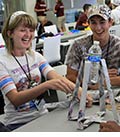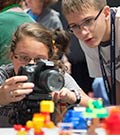Summer campers to explore built and virtual environment careers
Capitalizing on the aspirations of kids who dream of becoming architects or digital artists, the Texas A&M College of Architecture offers two weeklong campus summer camp experiences exposing college-bound high school and middle school students to these popular professions, as well as many other career opportunities related to the built and virtual environments.
For high school-aged students, [Camp Arch] (http://www.arch.tamu.edu/news/camparch/) , slated July 7-12, 2013, will explore all of the disciplines taught at the college. Additionally, for aspiring computer graphic artists and programmers in grades 6-12, the Department of Visualization is offering three different [Viz Kids] (http://www.youthadventureprogram.com/sessions.php) camp sessions between July 7-27.

Camp Arch
“Everyone knows what an architect is, but kids might not realize there are careers available in construction management, landscape architecture, urban planning or digital animation,” said Leslie Feigenbaum, the college's assistant dean for academic affairs. “Our goal is to excite young people about all disciplines taught at the college, including architecture.”
Camp Arch, for youths entering the 9th grade and up, emphasizes “hands-on” activities. Campers design and create building models in group and individual exercises, draw objects and present final projects for review.
Camp Arch participants are led through entry-level projects by college faculty and graduate students. While experience in art, drafting and drawing is helpful, it is not a camp requirement.
This year’s Camp Arch will feature a construction science component led by Edelmiro Escamilla, assistant professor of construction science. Participants will explore the lucrative field of construction management, meet industry professionals, tour construction sites and engage in leadership and team-building exercises.
"After hearing and talking to construction managers, I learned that the profession can be very exciting because the environment is always changing," said 2012 Camp Arch participant, Grady Roberts.
Other Camp Arch sessions will delve into landscape architecture, urban planning and visualization, where students will have an opportunity to work with video software to create a digital animation.
After a day of exploring their focus area of choice, campers, who reside in student dormitories, spend their evenings swimming, bowling or participating in other fun group activities under the supervision of volunteer Texas A&M student counselors.
For many, the camp marks the beginning of a life-long relationship with Texas A&M.
Of the 220 youngsters who participated in the four camps held 2008-11, many have returned to pursue degrees at the College of Architecture, including 34 new Aggies who returned to Camp Arch as counselors.
Application forms for this summer’s Camp Arch can be downloaded from the college [website] (http://www.arch.tamu.edu/news/camparch/application/) and must be postmarked by April 1, 2013.
Viz Kids Camp
Children in Texas A&M’s [Viz Kids] (http://www.youthadventureprogram.com/sessions.php) summer camps will get a taste of the unique academic experience offered by the Department of Visualization as they learn the basics of computer-generated animation and video game design.
Viz Kids camp, which runs July 7-27, 2013 in three separate weeklong sessions, each tailored for a specific age group, is about inspiring kids to embrace visual and technical creativity, said Tim McLaughlin, head of the department.
Camp leaders employ the department’s approach of simultaneously teaching aesthetic and technical problem solving, which is highly appealing to students who are right- and left-brain oriented — classic Renaissance-age thinkers.
“Too often, in today's K-12 environment, we're seeing curricula for kids that is aimed at accomplishing high achievement in science, technology engineering and math, but is devoid of visual literacy learning,” said McLaughlin. “We can't, as a nation, meet the demands of the digital media, big data, high-connectivity age problems without visual problem solvers.”
The camps, said McLaughlin, are good recruiting tools because they familiarize children and their parents with the department and help students choose the right courses in high school to prepare them for Texas A&M's undergraduate visualization program, should they eventually choose to apply.
“If they take only math and science and ignore visual and performing arts, they will have a hard time in our program,” said McLaughlin. “If they take only arts courses and do not pursue advanced math and science they will also have a hard time in our program.”
It’s a fairly unique idea to take both kinds of classes at the same time in high school, said McLaughlin, but it’s the best approach to ready students for the undergraduate visualization program, which prepares students for careers in graphic design, interactive media, visual effects and animation and new media fine arts.
The fourth annual Viz Kids camp is offered in three separate sessions, as part of the university's [Youth Adventure Program] (http://www.youthadventureprogram.com/index.php) .
Session 1, for students in grades 6-8, scheduled July 7-12 will include lessons in hand-drawn, stop-motion and Flash-based animation.
“They’ll learn how people and animals move to create action, how postures change to show emotion, and how these qualities can be extended to everyday objects and fanciful creatures,” said Howard Eilers, Viz Kids coordinator and associate professor of visualization. “Timing, editing, composition, and storytelling are all part of the animator's toolkit.”
In Session 2, scheduled July 14-19, students in grades 8-10 will partner in collaborative teams to create a video game.
“Campers will be responsible for developing the game theme, art, game mechanics and user interaction using an easy-to-learn game engine,” said Eilers. “Experience as an artist or programmer will be helpful, but not required. What's important is that campers be intrigued by the pursuit of making fun, creative interactive experiences.”
In Session 3, slated for July 21-27, campers from grades 10-12 will explore how character design, lighting, image composition, camera movement, imagery and editing all contribute to story telling, mood, and message.
“Campers should be prepared to work with through storyboarding, scripting, with cameras, in front of a camera, on a stage, and on computers to create compelling visuals,” said Eilers.
Viz Kids registration details and forms are available on the YAP [website] (http://www.youthadventureprogram.com/registration.php) .
Tags
- academics
- architecture
- building a better texas
- college culture
- construction science
- events
- feature
- landscape architecture & urban planning
- outreach
- rss
- visualization
- viz gallery
Related Posts
Students to design, build new house
Aggieland Saturday events focus on college offerings

Former students create four new endowed positions

Summit explored education advances with ‘smart’ cities
Follow Us
Facebook Twitter Vimeo Youtube Flickr RSS
Recent Posts

Planning prof heads study of disaster housing aid

A message from the dean

Former student remembered as expert planner

Leading educator named new head of Architecture Dept.











_thumbnail_small.png)
